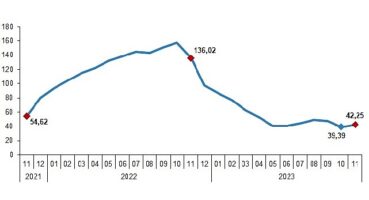At the center of monetary policy decisions is the European Central Bank (ECB), which this week carried out the fastest tightening cycle in its history. Despite the rising risk of recession, the ECB is expected to raise another 75 basis points despite the serious economic recession risk and to display a firm tightening stance against excessively high inflation. Although ECB’s swap pricing, which is showing a similar path to the Fed for now, points to an expectation that it can continue until May 2023 and move the target rate towards 2.75%, we think that the tightening cycle can be ended earlier due to the recession risks within the framework of the energy crisis. Lagarde is likely to reiterate at the press conference that QT will begin once interest rate normalization is complete, but is unlikely to give a date for it.
Since there are deep differences in structure between US and EU inflation, the effect of rate hikes in Europe will not bring down supply-driven prices. The bond yield gap between Germany and Italy is around 250 basis points and is quite deep. This will affect the status of the ECB’s program for spread control. Italy may pose a significant risk due to policy balances. The German debt market is also not secure enough, as Germany will be one of the direct contractors of the energy crisis. The exit of the European Central banks from the negative interest rate system is decisive in terms of the movements in government bonds and bank bills, and the profile of derivative assets in the portfolios of banks comes into play in this period. The Governing Council is expected to reintroduce the six-multiplier tier system to reduce interest payments to banks. As an alternative or complementary option, it is thought to raise the rate applied to nine outstanding TLTRO III loans to reduce the cost of excess liquidity to the ECB.

The ECB can reduce the cost of excess liquidity with a multiplier. Source: Bloomberg
While the ECB can also be included in this difficult equation due to the Italian-German debt market asymmetry, there is talk of a new joint bond that will be a reference for the Eurozone. It is said that Germany also supports this common Eurobond and since it is more difficult to follow a weighted joint debt market and therefore the benchmark interest rate instead of more than one borrowing market, the policy setting criteria of the ECB may also be positively affected. However, Germany is currently the economic risk contractor due to the energy crisis, so it will not be possible to safely look at the bond market at this point.
Kaynak: Tera Yatırım-Enver Erkan
Hibya Haber Ajansı















